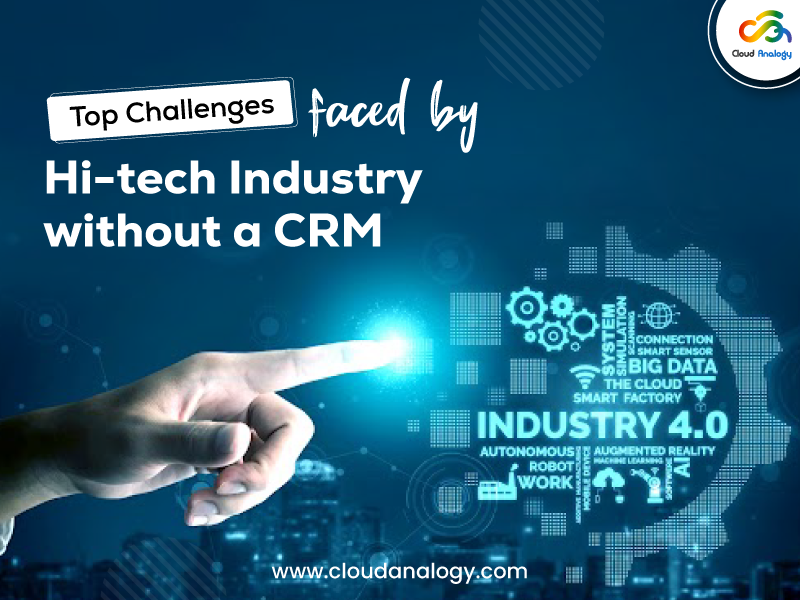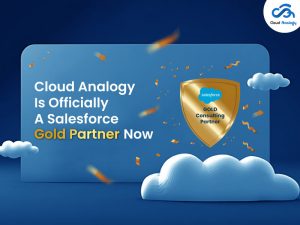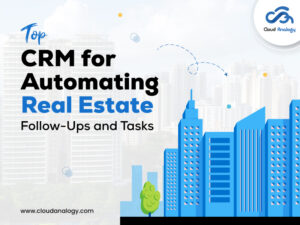Sharing is caring!
The high-tech sector thrives on innovation, rapid advancement, and continuous improvement. But under the gleaming surface of revolutionary products and services, most high-tech businesses encounter serious operational challenges. Perhaps the most critical one, which is often undervalued, is functioning without a complete Customer Relationship Management (CRM) system. In the competitive market of today, a CRM is not a tool; it is a centralized system that unifies customer interactions, optimizes processes and drives sustainable business growth. Without it, high-tech organizations risk their competitive edge.
The statistics paint a somber picture:
- An astonishing 94% of technology firms currently utilize a CRM solution to facilitate customer relationships and optimize sales effectiveness.
- Companies that use CRM systems successfully see their sales revenue increase by 41% on average and marketing costs decrease by 32%.
- Furthermore, organizations that have a CRM are 86% more likely to exceed their sales targets than organizations without a CRM.
- For every dollar invested in Customer Relationship Management (CRM), businesses usually gain an average Return on Investment (ROI) of $8.71.
These statistics highlight an important reality: the hi-tech sector, above many others, can benefit tremendously from a successful CRM. So, why are there still those who procrastinate, and what are the real-world challenges of doing business without this technology?
Top Challenges Faced by the Hi-tech Industry without a CRM Solution
Now, let’s discuss the main concerns that afflict hi-tech businesses when they don’t have a complete CRM solution.
1. Siloed Customer Data and Unorganized Information
Imagine finding out about your customer when their data is spread across multiple spreadsheets, individual mailboxes, old systems, and even on a clipboard. Scattered & unfiltered data give a bit-by-bit view, leading to a poor customer experience. The sales team tracks the recent history of communications, the marketing team monitors campaign activity history, and customer service sees service ticket history – no one sees a 360-degree picture of the customer.
The lack of a single source of truth results in:
Poor customer experiences: Customers are given mixed messages or need to repeat themselves to different departments, leading to frustration.
Missed opportunities: Without end-to-end visibility, opportunities for cross-selling and upselling can readily be missed, affecting revenue generation.
Suboptimal decision making: Business strategy decisions on product development, marketing strategy, as well as customer engagement, typically rely on poor or outdated information, resulting in wasted campaigns and misallocation of resources.
2. Inefficient Sales Processes and Lost Opportunities
With the rapid pace of the technology age, speed to market and streamlined sales cycles are essential. Manually managing a sales pipeline without a CRM is a disorganized process. Lead tracking is error-prone and manual, follow-ups are sporadic, and sales reps spend far too much time on administrative activities instead of interacting with prospective customers.
Top pain points are:
Poor lead management: Leads fall through the cracks, causing huge revenue loss. It becomes nearly impossible to find and concentrate on qualified leads, affecting sales productivity.
Inability to accurately predict sales: Without centralized data and automated monitoring, predicting sales trends accurately and establishing realistic goals is a guessing game. This affects resource planning and strategic management, and business forecasting becomes unreliable.
Long cycles: Paper processes involved in quoting, proposal writing, and deal tracking lengthen the period of time for closing deals, thus giving competitors an advantage in the intensely competitive tech market.
3. Poor Customer Service and Poor Retention Rates
Customer satisfaction is the secret to success in the hi-tech industry. Satisfied customers are turned into loyal consumers by it. Without a CRM, world-class customer service is a losing battle. Customer support representatives have no immediate access to customer history, previous interactions, or product usage patterns, and hence deliver an unsatisfactory customer experience.
This leads to:
Long response times: Customers wait longer to have their problems resolved because agents spend more time looking for information, impacting customer satisfaction.
Dissatisfied customers: Repeated issues or providing the same information over and over erode confidence and lower satisfaction, therefore affecting customer loyalty negatively.
High customer churn: Particularly impacting customer retention is bad service. Where the acquisition cost of new customers may be high in an industry, losing existing customers due to bad support damages long-term business growth.
Not making interaction personal: Since there are no customer profiles, personal service or product recommendation is not possible. Thus, customer interaction is not personal.
4. Limited Marketing Effectiveness and ROI Challenges
Marketing within the hi-tech industry has to be targeted and personalized. Without CRM, marketing is more of a “spray and pray” situation. Customer segmentation is still in its infancy, and hence, it becomes challenging to deliver the right message to the right audience.
The implications are:
Poor campaigns: Poor marketing communications fail to communicate with intended customer segments, leading to lower conversion and unnecessary marketing spending.
ROI tracking challenge: It entails measuring campaign performance and assigning the sales to projects, which is a difficult, if not impossible, task, making marketing optimization difficult.
Lack of alignment of sales and marketing activities: Due to no shared customer understanding, marketing and sales activities operate independently, leading to disjointed efforts and missed opportunities for lead development and ease of customer acquisition.
5. Lack of Scalability and Growth Limitations
As a technology company grows, its customers and operational complexities grow along with it. Disconnected data management processes and manual processes are not inherently scalable. What is achievable for a small startup can quickly become a limitation for a rapidly growing company.
This looks like:
Operational constraints arise when operations become laborious and inefficient, causing delays because the speed of customer interactions rises, thereby slowing down operational efficiency.
Inhibited innovation: The funds are being directed toward the management of manual labor rather than being directed toward R&D and innovation, which are the core elements of the high-tech industry. This would mean a lower comparative advantage.
Competitive disadvantage: Non-integrated companies do not possess the capability to quickly respond to changing markets or new customer needs and are open to quick, CRM-enabled competitors with streamlined business processes.
6. Data Security and Compliance Risks
In an era of more data privacy laws, managing sensitive customer information without a secure, centralized CRM is an at-risk situation. Local spreadsheets and databases are more exposed to breaches, unauthorized access, and compliance issues. A trustworthy CRM offers built-in security features and helps with compliance with laws like GDPR or CCPA, safeguarding customer information and the company’s brand reputation. Not doing so can lead to massive fines and loss of customer trust.
The Path Forward: TechSmart CRM for Your Hi-Tech Success
The difficulties for hi-tech businesses that don’t have a CRM are vast and can critically slow down business expansion and customer loyalty. Integrating a powerful, customized CRM solution provides a clear path to resolving these issues. From streamlining customer data and optimizing sales processes to optimizing customer service and marketing effectiveness, a CRM is a must-have for any high-tech business looking to achieve lasting success in today’s rapidly evolving digital economy.
Investing in a CRM is not a cost; it’s a strategic necessity for future-proofing your business and achieving an unprecedented competitive edge. TechSmart CRM can be your next-stop solution, packed with numerous features and providing a unified dashboard for all teams.
Apart from this, Cloud Analogy, being one of the top Salesforce consulting firms, offers best-in-class Salesforce consulting services and Salesforce application development so that YOU REST, and our CRM GIVES YOU THE BEST! Contact our team today to discuss your needs and get the custom solution!

Nitish Bhardwaj
Salesforce Principal Consultant | Chief Information Officer
An experienced Salesforce.com professional with 5+ years of experience in consulting on and delivering Salesforce projects for mid size, large and very large customers.Hire the best Salesforce Implementation Partner. Choose certified Salesforce Implementation Experts from Cloud Analogy now.










